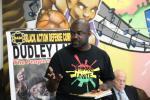
Ajamu Nangwaya
May 25th, 2014 could be considered as any other anniversary in the African calendar. On April 15, 1958 8 states of the African continent which were already independent and represented in Accra [Ghana] at the Conference of Independent Afrikan States called that day African Liberation Day. It was in 1963 on May 25th when already 33 countries had become independent that this new date was consecrated as African Freedom Day. 56 years since 1958 is a long period time. Much could be said of what did not work out for the continent and with which it is still struggling. Ajamu Nangwaya suggests some of the remedies that Africans should’ve taken for long to expect moving towards their real [political and economical] liberation.
1. Create or join organizations that are committed to Afrikan solidarity and liberation: Organizations are critical to the work of anti-imperialist international solidarity activism. They are able to mobilize and organize people and other resources notwithstanding the ebb and flow of mass movement organizing. The members of the elite fear the organizational unity and cooperation of the people because it might lead to the compromising or blocking of the intended actions of the forces of oppression.
2. Build organizational ties and coordinate our work with grassroots organizations: It is critically important for us to develop principled and solidaristic relations with organizations that are led by the oppressed and are committed to advancing structural change in Afrika. The development of comradely and organic ties with organizations that are organizing against patriarchy, capitalism, racism and/or homophobia would enable international solidarity groups to better direct their activism against the metropolitan institutions and power centres that are facilitating oppression in Afrika. Direct people-to-people contact would reduce the likelihood of anti-imperialist forces assuming to know the priorities of partners in the global South. The development of established channels of communication would limit the influence of domestic and overseas non-governmental organizations (NGOs) that are promoting charity instead of solidarity and liberation.
3. Promote mass public education: Solidarity organizations need to develop public education campaigns that offer critical tools to the public so as to aid them in understanding political events on the home front, in Afrika and the global South in general. The dominant media outlets cover stories in ways that reinforce the outlook of transnational corporations and the political elite. Therefore, when an incident such as Nigeria’s Boko Haram’s kidnapping of over two hundred school girls is presented to mass public, it is quite easy for many members of the working-class to support military intervention by the West. They do not understand the geo-political implications of such a course of action and the ways that the West’s presence would strengthen the economic and political interests of Nigeria’s neocolonial rulers and their imperial backers from the United States, Canada and Europe. Constant and interrogative public education campaigns that use all available media and extend into the spaces where the people are located would make for effective educational work.
4. Develop campaigns that oppose Western military presence: The anti-war/peace movement in the West needs to give serious organizing resources to the work of building mass opposition to the increasing militarization of Afrika. According to Abayomi Azikiwe, the editor the Pan-African News Wire, “The U.S. ruling class through its quest for mineral resources and strategic dominance has focused a tremendous amount of attention on Africa and the so-called Middle East. The founding of the U.S. Africa Command (AFRICOM) in 2008 under Bush has enhanced its operations under Obama.” AFRICOM, NATO or Western powers have directly or indirectly intervened in Libya, Mali, Central Afrikan Republic, Nigeria, Ivory Coast, Central Afrika and Somalia. These military operations are directed at maintaining western domination and/or checking China’s development and investment programmes across the continent.
5. Contribute to the capacity of movements to create alternative institutions: The revolutionary theorist, military strategist, and practitioner Amilcar Cabral cautions us that the people are not interested in social change because of the ideas being promoted by thinkers or activists. The people enter the stage of history as dramatic actors because they want “to win material benefits, to live better and in peace, to see their lives go forward, to guarantee the future of their children.” Therefore, the individuals and organizations that are contributing to Afrikan liberation and solidarity ought to give priority to projects that build transformative economic, social and political projects and programmes. It is necessary for people-controlled organizations to build the embryonic institutions of the liberated society today. These entities will be used as spaces to equip the people with the knowledge, skills and attitude that are needed to fight the oppressive order while preparing the labouring classes for life in the future non-capitalist, anti-oppressive society.
6. Racialized people must be central participants in anti-imperialism activism: Too often the international solidarity or antiwar/peace movements in North America and Europe are strategically and operationally directed and controlled by whites. It is certainly an indictment of the anti-war/peace movement when it is unable to make spaces within its ranks for the leadership and participation of racialized and Indigenous peoples.
Please read the full reflection by Ajamu Nangwaya around these propositions at the following link: http://dissidentvoice.org/2014/05/afrikan-liberation-day-and-the-commitment-to-an-anti-imperialist-pan-afrikan-solidarity/
